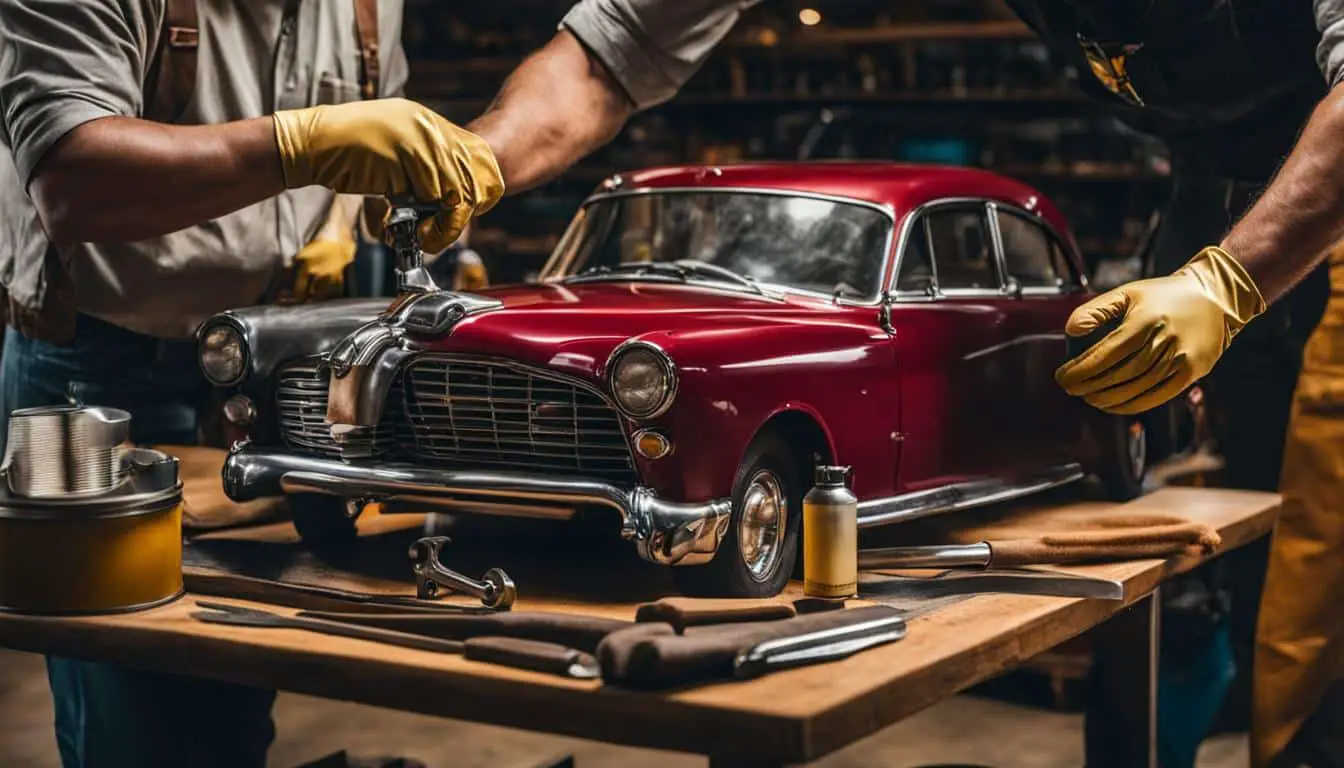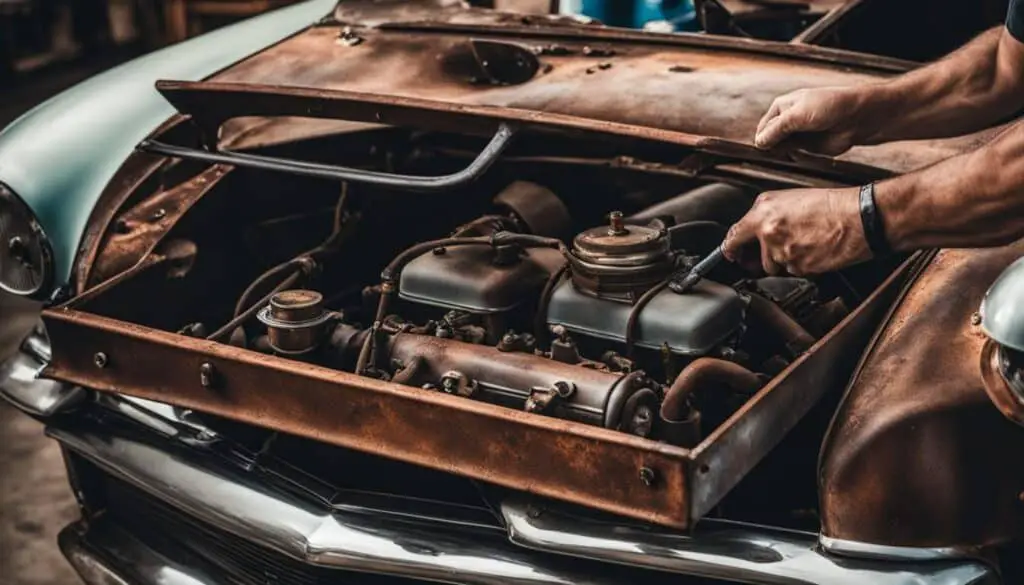
How to Maintain a Classic Car
Welcome to my expert advice on how to maintain and care for your classic car. Whether it’s a vintage car or a classic beauty, regular maintenance is crucial in ensuring your timeless treasure runs smoothly. When it comes to classic cars, prevention is key. Regular maintenance can help identify and prevent potential issues before they become a more significant problem, ultimately saving you time and money and keeping your classic car on the road for years to come.
From keeping your car clean to checking the oil, there are a few things you can do to maintain and care for your classic car:
- Regularly clean your car, including the body, interior, and windows, to prevent buildup of dirt and debris that can damage the paint and upholstery.
- Check and change the oil and other fluids regularly to keep your classic car’s engine running smoothly.
- Inspect your classic car’s tires and brakes to ensure they’re in good condition and replace them as needed.
- Keep your classic car covered and stored in a dry, temperature-controlled environment to prevent rust and corrosion.
- Take your classic car for regular inspections by a trusted mechanic to identify any potential issues and address them before they become a more significant problem.
With these classic car maintenance tips, you can keep your vintage or classic beauty running smoothly for years to come.
Key Takeaways:
- Regular maintenance is crucial in ensuring your classic car runs smoothly.
- Cleaning your car regularly, checking and changing fluids, inspecting tires and brakes, and proper storage are essential in maintaining your classic car.
- Take your classic car for regular inspections by a trusted mechanic to identify any potential issues.
Classic Car Restoration and Repair
Restoring and repairing classic cars is a challenging task that requires specialized knowledge and skills. It’s not only about fixing mechanical problems or replacing parts, but also preserving the original beauty and heritage of the car. Here are some essential tips for maintaining, restoring, and preserving your classic car:
Regular Maintenance
The first and most important step in restoring and repairing a classic car is regular maintenance. This includes routine checks of the engine, transmission, suspension, brakes, and other vital components. Regular maintenance will help you catch any issues early on, preventing further damage down the line.
Additionally, you should always use original or high-quality reproduction parts when replacing any components. This will not only ensure the longevity of your classic car but also help maintain its authenticity and value.
Addressing Common Issues
Classic cars are prone to certain issues due to their age and design. Some of the most common issues include rust, electrical problems, and worn-out parts. It’s essential to address these issues promptly to prevent more severe damage and restore the vehicle’s safety and performance.
Rust is a common problem in classic cars, and it can cause severe damage if left unaddressed. You should regularly inspect your car for any signs of rust and have it professionally treated if necessary.
Electrical problems are also common in classic cars, especially those with older wiring. It’s essential to inspect your car’s electrical system regularly and address any issues promptly.
Worn-out parts can significantly impact your car’s performance and safety. It’s essential to regularly inspect and replace any worn-out parts, such as brake pads, suspension components, and tires.
Preserving Classic Beauty
Preserving the classic beauty of your car is just as important as restoring and repairing it. The following tips will help you maintain your car’s original appearance:
- Regularly clean and wax your car to protect the paint and prevent rust.
- Store your car in a dry, climate-controlled environment to prevent damage from moisture and humidity.
- Use the correct type of fuel, oil, and other fluids specified by the manufacturer to prevent damage to the engine and other components.
By following these tips, you can ensure your classic car will remain not only a beautiful piece of history but also a reliable and safe vehicle for years to come.

Tips for Antique and Collector Car Maintenance
Antique and collector cars require a unique approach to maintenance due to their age and historical significance. As a classic car enthusiast, I understand the importance of keeping these valuable assets in pristine condition. In this section, I’ll share some essential tips for maintaining your antique or collector car.
Proper Storage
Storing your antique car correctly is crucial to its preservation. The ideal storage location should be clean, dry, and well-ventilated, with a consistent temperature and humidity level. Avoid parking your car outside for an extended period, as exposure to the elements can cause severe damage.
Regular Maintenance
Regular maintenance is essential for keeping your antique car running smoothly. Make sure to change the oil and oil filter every 3,000 miles or three months, whichever comes first. Also, check the fluids regularly and replace them as needed. Pay close attention to the brakes, tires, and suspension, as these parts tend to wear out faster on older cars.
Preserving Original Parts
Preserving the original parts of your antique car is crucial to maintaining its value. Whenever possible, try to repair or restore damaged parts instead of replacing them with aftermarket components. Keeping the original parts intact will make your car more desirable to collectors and increase its overall value.
Professional Assistance
If you’re unsure about how to care for your antique car, don’t hesitate to seek professional assistance. Look for a mechanic or restoration specialist with experience working with antique and collector cars. They can provide valuable advice on maintenance, repairs, and preservation techniques specific to your vehicle.
By following these tips, you can keep your antique or collector car in top condition for years to come. Remember to treat your car with care and respect, and it will reward you with years of driving pleasure.
FAQ
What are some classic car maintenance tips?
Some classic car maintenance tips include regular oil changes, checking and replacing fluids, inspecting the electrical system, and keeping the exterior clean and protected.
How often should I perform maintenance on my classic car?
It is recommended to perform regular maintenance on your classic car at least once every three to six months, depending on the usage and condition of the vehicle.
What should I do if my classic car is not running smoothly?
If your classic car is not running smoothly, it is important to check the ignition system, fuel system, and carburetor. Additionally, addressing any potential issues with the engine or transmission may be necessary.
How can I prevent rust on my vintage car?
To prevent rust on your vintage car, it is essential to keep the vehicle clean and dry. Regularly wash and wax the exterior, and apply rust-proofing products to vulnerable areas, especially during winter months.
What steps are involved in restoring a classic car?
Restoring a classic car typically involves a thorough inspection, disassembly, repair or replacement of parts, painting, reassembly, and final detailing. It is important to have a clear plan and access to the necessary tools and resources.
How can I preserve the originality of my classic car during restoration?
To preserve the originality of your classic car during restoration, it is important to document and carefully remove original parts, conduct research on authenticity, and source replacement parts that closely match the original specifications.
What are some common issues to look out for in antique cars?
Some common issues to look out for in antique cars include electrical problems, worn-out suspension components, leaking seals and gaskets, and corrosion due to the vehicle’s age and exposure to the elements.
How should I store my collector car properly?
To store your collector car properly, ensure it is stored in a clean, climate-controlled environment with low humidity levels. Use a breathable car cover and periodically start and run the engine to prevent damage from prolonged inactivity.
What maintenance routines are important for collector cars?
Important maintenance routines for collector cars include regular inspections, oil and fluid changes, tire pressure checks, battery maintenance, and periodic detailing to maintain the vehicle’s overall condition.
